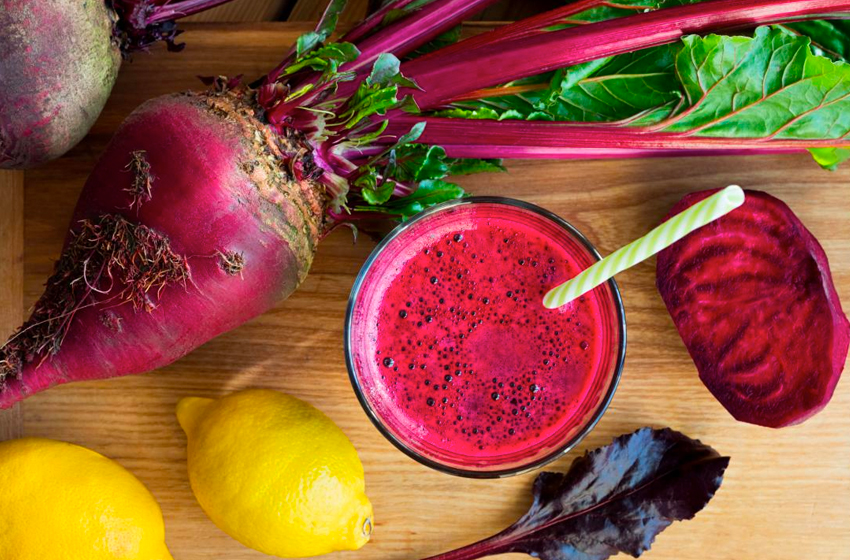A lot of people either love beets or hate them. In any case, of late, these bulbous root vegetables have turned out to be very popular. While eating beets is the most ideal approach, drinking their juice offers some astonishing advantages also. Studies demonstrate that beetroot juice can help lower blood pressure. This is critical to note, as 1 in each 3 grown-ups in the US has hypertension. There are other significant ways beetroot juice can benefit your wellbeing. In this post, we will discuss these in detail.
A lot of people either love beets or hate them. In any case, of late, these bulbous root vegetables have turned out to be very popular. While eating beets is the most ideal approach, drinking their juice offers some astonishing advantages also.
Studies demonstrate that beetroot juice can help lower blood pressure. This is critical to note, as 1 in each 3 grown-ups in the US has hypertension.
There are other significant ways beetroot juice can benefit your wellbeing. In this post, we will discuss these in detail.
What Are The Health Benefits Of Beetroot Juice?
The nitrates in the juice help lower blood pressure and prevents the heart. While the anti inflammatory properties of the juice help battle cancer, the betalains it contains can help lower glucose levels.
1. May Aid Diabetes Treatment
In an investigation, consuming a glass full of some beetroot juice demonstrated a critical diminishing in the post-meal blood sugar levels. The betalains in the juice (effective antioxidants) are responsible for this effect.
Comparative impacts were seen in over-weight people. Obese people who consumed the juice alongside carbs indicated lower insulin resistance contrasted with their non-obese counterparts who did not drink the juice.
The nitrates in the juice help lower circulatory strain. This impact was more complemented in individuals with sort 2 diabetes.
2. May Help Fight Cancer
The most significant cancer prevention agent in beetroot juice is betacyanin, which battles free radicals. This is one way the juice can add to disease counteractive action.
The anti-inflammatory properties of beetroot juice can likewise help treat chronic lymphocytic leukemia (blood and bone marrow cancer). The betacyanin in the juice additionally plays a noteworthy role here.
Beetroot juice was likewise found to have anti-cancer impacts compared to doxorubicin, an anticancer medication.
The juice decreases cancer cell expansion and inflammation and stimulates cell death in cancers of the skin, liver, lungs, and the throat.
3. May Improve Heart Health
Beetroot juice is a major source of nitrates. Nitrates widen the blood vessels, bringing down blood pressure. This is advantageous to the heart.
The juice additionally reduces overstimulation of the nervous system, which may increase pulse levels and lead to heart disease.
In another examination, people consuming beetroot juice saw an extensive reduction in their blood pressure levels in only 30 minutes. However, this impact died in 24 hours.
Beetroot juice may improve wellbeing in patients who had heart failure.
The juice may likewise lower cholesterol levels. In a case study, beetroot extracts brought down triglycerides and total cholesterol levels. It additionally expanded the degrees of HDL (the good cholesterol). This impact could be credited to the flavonoids in beets.
4. May Improve Athletic Performance
Beetroot juice consumption has been connected to upgrades in a few parameters related with the cardiovascular and respiratory frameworks.
The juice demonstrated effective impacts in some of the best sprinters too. Fifteen days of beetroot juice intake improved the stamina in these sprinters. In any case, it didn't appear to improve other physical parameters, similar to greatest physical take-up.
5. May Cure Erectile Dysfunction
There is no solid proof that beetroot juice can treat erectile dysfunction. In any case, a dominant part of the affected men appear to swear by it.
A few sources propose that nitric oxide may have an important role to play in treating erectile dysfunction. The compound loosens up blood vessels and improves blood flow. This property, aside from bringing down blood pressure, likewise upgrades penile blood flow.
Since erectile dysfunction happens because of absence of appropriate blood flow to the penile muscles, nitric oxide in beet juice may help improve it.
Another significant compound engaged with erection is cGMP (cyclic guanosine monophosphate). This compound loosens up the arteries and builds blood flow to the penis. An investigation demonstrates that sustenances wealthy in nitrates (which convert to nitric oxide in the body) can expand the degrees of cGMP.
6. May Reduce Risk Of Dementia
There is less research to help this reality. A few sources propose that dietary nitrate can improve blood stream to the cerebrum, in this way cutting the danger of dementia or different types of psychological decrease.
7. May Promote Liver Health
Betaine in beetroot juice may help treat non-alcoholic greasy liver ailment. Be that as it may, this was demonstrated uniquely in creature contemplates.
In another rodent study, dietary betaine was found to improve liver capacity. The compound shielded the livers of rodents from poisons.
8. Can Be Used As A Hair Dye
In spite of the fact that this isn't an advantage in essence, the juice is frequently used as a hair color. In the event that you need a more profound red tint to your hair, here's the way you can utilize the juice:
Blend beetroot juice with a bearer oil (like coconut oil). Apply this blend generously to your hair. Cover your hair with a cling wrap. Leave it on for about 60 minutes. Remove the cling wrap and wash your hair. Beetroot juice is quick turning into a superfood, and just all things considered.
Some anecdotal proof additionally suggests that the juice can help weight reduction and ease constipation. However, there is no research to support this statement. Hence, consult your primary care physician before using the juice for this reason.
Beetroot juice is packed with strong mixes. In the below section, we will take a look at the detailed nutritional profile.
How Do You Make Beetroot Juice At Home?
What You Need
- 2-4 medium-sized beetroots with their tops on
- A container
- A juicer
- Wash the beets thoroughly
- Remove the Skin
- Cut the beets and the tops into reasonable pieces.
- Put the beets in the juicer and blend it.
- You can serve the juice chilled. You can add some sweetener to the juice.
- Beetroot juice normally tastes earthy. You can improve its taste by including a dash of lemon.
Drinking the juice consistently can offer you the advantages talked about in the previous section.
What Are The Side Effects Of Beetroot Juice?
• Can Cause Beeturia
Beeturia is the discoloration of urine following the intake of beetroots/beetroot juice or nourishments made with them. The pigments in beets, which belong to the family of betacyanins, may cause this.
Beeturia is an harmless condition. Reducing the intake of beetroot juice can rectify it. Be careful as this condition is often observed in people who have iron deficiency.
• Can Increase Risk Of Kidney Stones
Beets/beetroot juice contain(s) oxalates, which are generally in charge of kidney stones. Devouring a lot of nourishments high in oxalates can build the danger of kidney stones.
In the event that you have a background marked by kidney stones or are in danger, it would be ideal if you stay away from beetroot juice.
• May Lower Blood Pressure Way Too Much
Beetroot juice can lower pulse levels. In the event that you are now on prescriptions to lower pulse, if it's not too much trouble check with your primary care physician. They may modify the dose of your medicine as needs be.
Beetroot juice is the new superfood. It is anything but difficult to make and is very reviving. Having it consistently – directly in the first part of the day or late at night – can do some amazing things for your wellbeing over the long haul.
Be careful about overconsumption, however. Likewise, maintain a strategic distance from admission on the off chance that you have kidney issues.
Do you as of now have beetroot squeeze consistently? How would you like the taste? Do share your musings by leaving a remark in the crate beneath.













